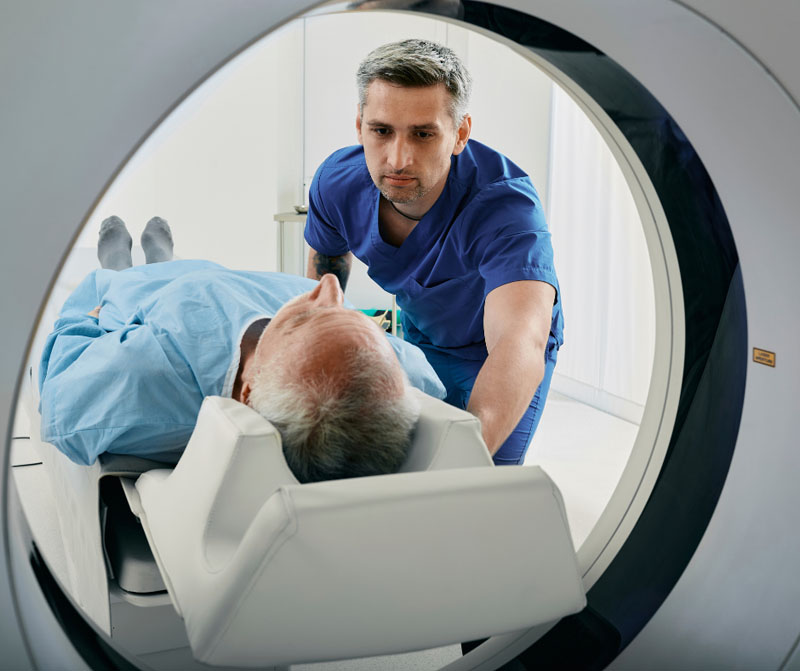Heart disease is often silent until it leads to a heart attack or stroke. A CT heart scan can detect early warning signs, helping you and your doctor assess your risk and take preventive action.
What a Heart Scan Reveals About Your Health
Doctors can use many tests to understand your heart health. For example, your primary care provider can take your blood pressure and order blood work to check your cholesterol levels. High blood pressure and unhealthy cholesterol levels are two key risk factors for heart disease.
Your physician can also order imaging to help identify and characterize heart disease and inform a diagnosis. A heart scan can tell your doctor if you have or are at risk for coronary artery disease (CAD), the most common heart disease in the U.S. CAD happens when fatty deposits called plaque build up in the coronary arteries. These important blood vessels deliver blood to the heart. When plaque builds up, the vessels become narrower, and blood has a harder time traveling to your heart.
Plaque can also break off and form blockages that can cause a heart attack or stroke.
Depending on the type of imaging ordered, a heart scan can show how much calcium is in your heart arteries — a sign of plaque buildup — or narrowing or blockages of these blood vessels.
Two Types of Heart Scans
Heart scans use a type of imaging called computed tomography (CT) that takes multiple X-rays of your body. Your doctor can view the images separately, or a computer can combine the different “slices,” or layers of images to create a 3D image. For a CT scan of the heart, the images create a 3D picture of your heart muscle, the arteries, and surrounding areas.
Two commonly ordered heart scans include the calcium scoring test and the more advanced coronary CT angiography.
Calcium Scoring Tests
Also called a coronary artery calcium test or coronary calcium scan, a calcium scoring test is performed with CT technology and measures the amount of calcified plaque in your coronary arteries. Plaque is a buildup of fat, cholesterol, calcium, and other substances in the artery walls. Over time, calcified plaque can contribute to artery narrowing, increasing the risk of heart disease. Higher calcium levels can also suggest that CAD is becoming more advanced.
During a coronary calcium scan, your radiology technologist will position you lying down on the table of the CT scanner in order to take pictures of your heart. You’ll have small electrodes attached to your chest that record your heart’s electrical activity. The electrodes help the technologist know when to take images. You may need to hold your breath for brief periods, to improve the clarity of your images, as well.
The test itself takes only about 10 minutes. Afterward, a radiologist will review the images and give you a calcium score of 0 to 400 (or higher). Here’s what the numbers mean:
- 0: You show no signs of CAD.
- 1-10: You have minimal signs of CAD and your risk of serious heart events is low.
- 11-100: You have mild signs of narrowed arteries and a mild risk of CAD.
- 101-400: Your radiologist saw some plaque and you have a moderate risk of a future heart event.
- Higher than 400: You have a high risk for a heart attack.
Knowing your calcium score can help you and your provider make decisions about treatment. For lower scores, you may decide to make changes to your diet and/or exercise regimen, take low-dose aspirin, or start medications to lower cholesterol (statins). For higher scores, your physician may order additional imaging and more advanced treatment or surgery.
Coronary CT Angiography (CCTA)
Like a coronary calcium scoring test, a CCTA heart scan can help your doctor see if you have arteries narrowed by plaque. However, a CCTA scan shows your arteries and how much (if any) plaque could be building up along their walls.
A more advanced CCTA scan works similarly to a coronary calcium score CT scan, but with a key difference — before the test, you receive a contrast dye that contains iodine enhancing the visibility of arteries. This helps the radiologist visualize the blood flow through your arteries in the highest definition. You’ll receive the iodine through an IV in your arm. In some cases, you may need to take a beta blocker to slow your heart rate down for the test, as well.
CCTA takes a little longer than a coronary calcium score CT. The scanning process itself is quick. It may take as few as 15 minutes, but the total time may extend beyond 20 minutes if additional medications are required to adjust your heart rate before imaging.
Which Heart Scan Do You Need? CCTA vs. Calcium Score
When deciding between a CCTA and a calcium score heart scan, it’s essential to consider your specific health needs. A CCTA provides detailed images of the coronary arteries and can help identify blockages, making it useful if you have symptoms of heart disease.
In contrast, a calcium score test measures the amount of calcium in the coronary arteries and is primarily used to assess the risk of heart disease, especially if you have risk factors but no current symptoms. Your doctor will recommend the appropriate scan based on your medical history and the information needed for an accurate diagnosis.
Who Should Get a Calcium Scoring Test?
Your doctor may recommend a coronary calcium score if you have heart disease risk factors but don’t currently have symptoms. Having a coronary calcium score may be a good idea if you:
- Are a man age 45 or older or a woman age 55 or older
- Currently smoke or used to smoke
- Experience high levels of stress
- Have a history of high blood pressure, high cholesterol, or diabetes
- Have a family history of heart disease
- Live a sedentary lifestyle
Who Should Get a CCTA Scan?
Your doctor may recommend a CCTA test if you have symptoms, such as chest pain or discomfort, and other symptoms. A CCTA can offer more information than an echocardiogram (ECG) or chest X-ray — doctors sometimes order CCTA when these and other tests don’t provide a clear explanation of your symptoms.
CCTA scans can also show structural problems in your heart, scarring from a previous heart attack, and fluid buildup around your heart — all signs that can help guide treatment for existing or potential heart concerns.
Bring Your Heart Health into Sharper Focus
Heart health scans can help you and your primary care provider or cardiologist get a deeper look, learn more about your risk for heart disease, or better understand why you’re having symptoms. The test you need depends on many factors, and the best way to know which one is right for you is to have a conversation with your doctor.







